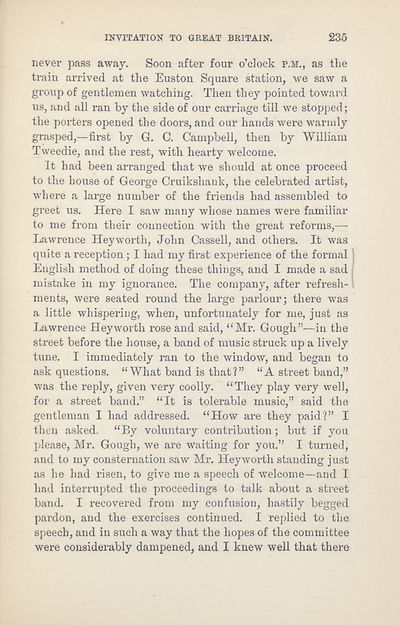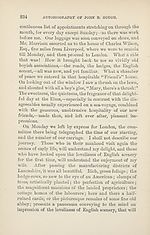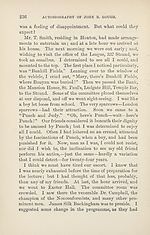Download files
Complete book:
Individual page:
Thumbnail gallery: Grid view | List view

INVITATION TO GREAT BRITAIN.
235
never pass away. Soon after four o’clock p.m., as the
train arrived at the Euston Square station, we saw a
group of gentlemen watching. Then they pointed toward
us, and all ran by the side of our carriage till we stopped;
the porters opened the doors, and our hands were warmly
grasped,—first by G. C. Campbell, then by William
Tweedie, and the rest, with hearty welcome.
It had been arranged that we should at once proceed
to the house of George Cruikshauk, the celebrated artist,
where a large number of the friends had assembled to
greet us. Here I saw many whose names were familiar
to me from their connection with the great reforms,—
Lawrence Hey worth, John Cassell, and others. It was
quite a reception; I had my first experience of the formal j
English method of doing these things, and I made a sad |
mistake in my ignorance. The company, after refresh-'
ments, were seated round the large parlour; there was
a little whispering, when, unfortunately for me, just as
Lawrence Heyworth rose and said, “Mr. Gough”—in the
street before the house, a band of music struck up a lively
tune. I immediately ran to the window, and began to
ask questions. “What band is that?” “A street band,”
was the reply, given very coolly. “They play very well,
for a street band.” “It is tolerable music,” said the
gentleman I had addressed. “How are they paid?” I
then asked. “By voluntary contribution; but if you
please, Mr. Gough, we are waiting for you.” I turned,
and to my consternation saw Mr. Heyworth standing just
as he had risen, to give me a speech of welcome—and I
had interrupted the proceedings to talk about a street
band. I recovered from my confusion, hastily begged
pardon, and the exercises continued. I replied to the
speech, and in such a way that the hopes of the committee
were considerably dampened, and I knew well that there
235
never pass away. Soon after four o’clock p.m., as the
train arrived at the Euston Square station, we saw a
group of gentlemen watching. Then they pointed toward
us, and all ran by the side of our carriage till we stopped;
the porters opened the doors, and our hands were warmly
grasped,—first by G. C. Campbell, then by William
Tweedie, and the rest, with hearty welcome.
It had been arranged that we should at once proceed
to the house of George Cruikshauk, the celebrated artist,
where a large number of the friends had assembled to
greet us. Here I saw many whose names were familiar
to me from their connection with the great reforms,—
Lawrence Hey worth, John Cassell, and others. It was
quite a reception; I had my first experience of the formal j
English method of doing these things, and I made a sad |
mistake in my ignorance. The company, after refresh-'
ments, were seated round the large parlour; there was
a little whispering, when, unfortunately for me, just as
Lawrence Heyworth rose and said, “Mr. Gough”—in the
street before the house, a band of music struck up a lively
tune. I immediately ran to the window, and began to
ask questions. “What band is that?” “A street band,”
was the reply, given very coolly. “They play very well,
for a street band.” “It is tolerable music,” said the
gentleman I had addressed. “How are they paid?” I
then asked. “By voluntary contribution; but if you
please, Mr. Gough, we are waiting for you.” I turned,
and to my consternation saw Mr. Heyworth standing just
as he had risen, to give me a speech of welcome—and I
had interrupted the proceedings to talk about a street
band. I recovered from my confusion, hastily begged
pardon, and the exercises continued. I replied to the
speech, and in such a way that the hopes of the committee
were considerably dampened, and I knew well that there
Set display mode to:
![]() Universal Viewer |
Universal Viewer | ![]() Mirador |
Large image | Transcription
Mirador |
Large image | Transcription
| Antiquarian books of Scotland > Temperance > Autobiography and personal recollections of John B. Gough > (247) |
|---|
| Permanent URL | https://digital.nls.uk/125990333 |
|---|
| Description | Thousands of printed books from the Antiquarian Books of Scotland collection which dates from 1641 to the 1980s. The collection consists of 14,800 books which were published in Scotland or have a Scottish connection, e.g. through the author, printer or owner. Subjects covered include sport, education, diseases, adventure, occupations, Jacobites, politics and religion. Among the 29 languages represented are English, Gaelic, Italian, French, Russian and Swedish. |
|---|

